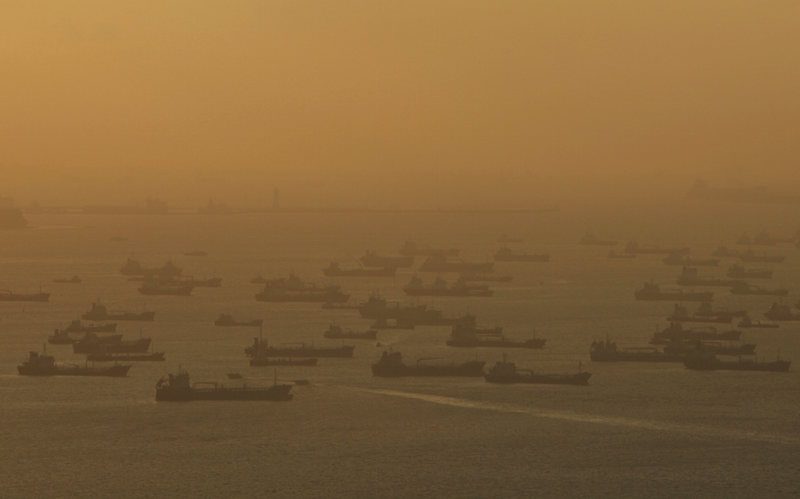Cargo ships and oil tankers line up the eastern coast of Singapore in this July 22, 2015 file photo. REUTERS/Edgar Su
The ICC International Maritime Bureau is calling for a global reporting system in the wake of an alarming uptick in the number of piracy and armed robbery attacks against ships at sea.
The call to action was presented during discussions with key maritime stakeholders that took place the IMB International meeting on Global Piracy, Armed Robbery and Maritime Security held this week in Kuala Lumpur. The meetings, co-hosted by the Malaysian Maritime Enforcement Agency, Interpol and the Royal Malaysian Police, drew more than 200 delegates from 30 countries and focussed on the major risks factors in the evolving threat of international piracy, particularly in South East Asia.
A maritime piracy report by the IMB released in July highlighted the continued hijacking threat of small coastal tankers in South East Asia, averaging one attack every two weeks. According to the report, five small tankers were hijacked in South East Asian waters in the second quarter of 2015 alone, bringing the total number of vessels hijacked globally in 2015 to 13. The report noted that a total of 134 incidents of piracy and armed robbery against ships were reported to the IMB Piracy Reporting Centre (PRC) in the first six months of 2015; an increase on the 116 reports for the corresponding period in 2014.
At the meetings, the keynote speech was delivered by the Malaysian Deputy Home Minister who commented on the resurgence of piracy and armed robbery in South East Asia, stressing the importance of maritime domain to Malaysia and the need for cooperation with neighboring countries in the region in order to apprehend the kingpins behind the piracy activity.
Inspector General of the Royal Malaysian Police gave a review of the issues in respect to the collection of evidence and international conventions from a law enforcement perspective of piracy and armed robbery investigations. The Inspector General stated that it will be useful to conduct a detailed review of the laws and conventions affecting the prosecution of pirates, with a view towards incorporating UNCLOS into Malaysian domestic law in order to ensure that criminals can be prosecuted.
The Malaysian Maritime Enforcement Agency (MMEA) highlighted examples of recent successes, including the arrest and prosecution of the SUN BIRDIE gang and arrest of the ORKIM HARMONY hijackers.
The industry keynote also pointed to other key challenges facing the shipping industry such as the overwhelming number of illegal migrations.
To improve the situation, participants considered how a common worldwide information sharing framework could possibly expedite the receipt and distribution of critical details needed to enable naval and law enforcement forces to respond quickly enough to protect seafarers and arrest perpetrators.
Pottengal Mukundan, Director of IMB commented: “Information sharing and coordinated action between concerned coastal states is crucial in responding to this threat. However, the proliferation of reporting centers in some regions could create a degree of confusion that can leave seafarers and ships unnecessarily at risk.”
Industry highlighted a number of actions taken to support international effort to suppress maritime crime and to protect seafarers. Further development of the Best Management Practice and a standardization of global reporting is high on their agenda.
“For crimes at sea, rapid response is crucial if there is to be any possibility of prosecuting the pirates,” added Mukundan. “The IMB Piracy Reporting Centre plays a crucial role liaising between merchant ships and coastal authorities and navies, and is prepared to further enhance the effectiveness of these joint efforts.”
Industry stakeholders suggested this important role could be broadened offering an opportunity for the IMB to play a leading role.
The international gathering of maritime security experts representing governments, law enforcement agencies, navies, international organizations the shipping industry and seafarers’ unions also considered the threats created by organized crime, human smuggling and acts of terrorism. Beyond reporting and response issues, the meeting also addressed other areas of concern such as the impact on seafarers and their families, post-incident protection of evidence, and the regional differences in the pirates’ strategies of attack.
Other developments which were considered included the use of armed guards and whether or not they fit into comprehensive response measures in different high risk areas, the more co-ordinated use of naval vessels in anti piracy operations, the challenges faced by law enforcement in arresting and prosecuting pirates and armed robbers, and the targeting of product oil cargoes on board vulnerable vessel.

 Join The Club
Join The Club











